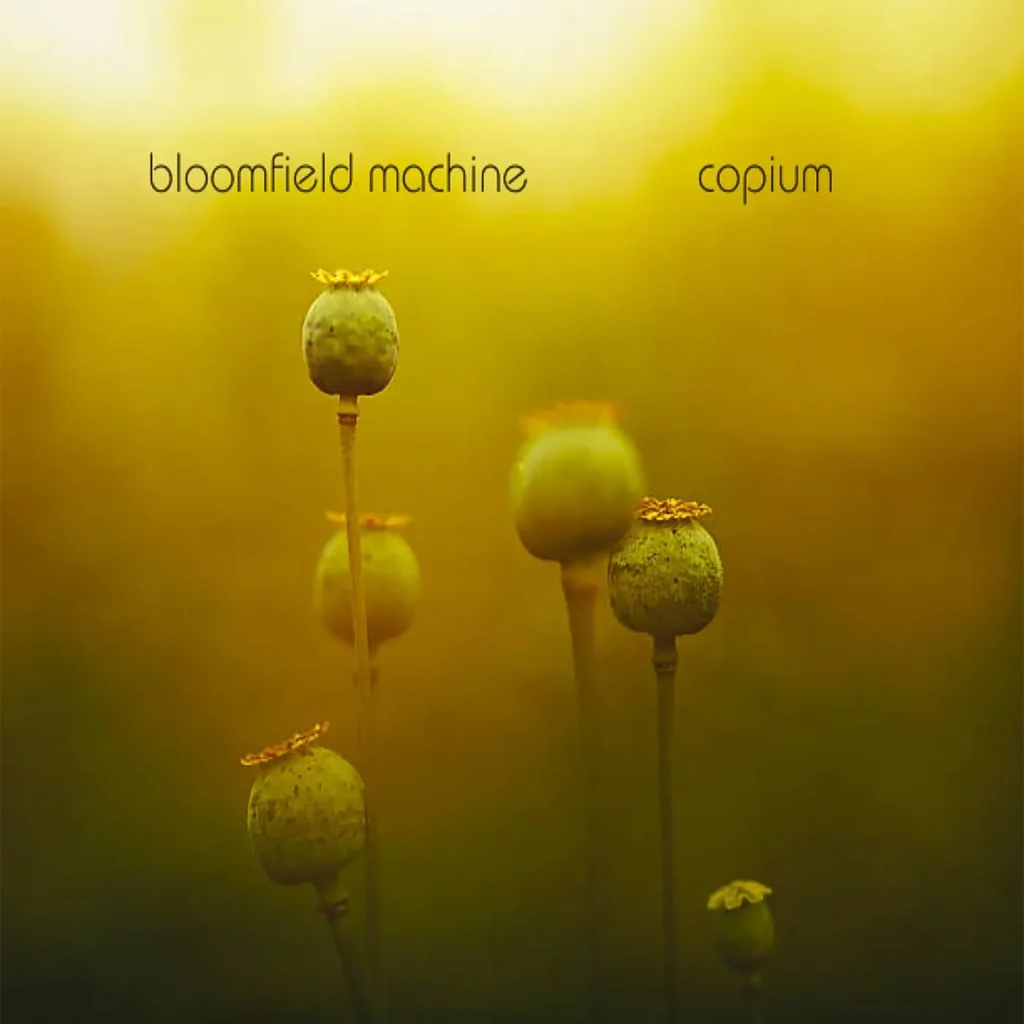There’s something oddly refreshing about Copium, the latest from Bloomfield Machine. It’s not because it’s particularly groundbreaking or life-changing, but because it’s not trying to be either. In a music landscape where every release comes with a glossy press kit, a hype cycle, and some vague promise of “pushing boundaries” or something of the sort, Copium shows up like a quietly weathered friend offering you a warm blanket and a couch to cry on.
Now, let’s get this out of the way: yes, the name Copium is a meme. It’s a portmanteau of “cope” and “opium,” originally tossed around in Twitch chats and 4chan threads as a punchline for denial, and writing that out for the purpose of explanation gave me a real “how do you do fellow kids” recoiling. But here? It’s repurposed into something surprisingly earnest. This isn’t an ironic record. It’s not sneering at you from behind a layer of postmodern sarcasm. It’s trying to feel something. Maybe cope a little. But who isn’t? It was recorded in Bloomfield Machine’s Huntington Beach apartment, and you can feel the walls of that room in every track. This is minimalism as emotional language, not stripped-down for aesthetics, but because there’s nothing left to hide behind. Just synths, loops, and whatever feelings didn’t make it into the group chat.

From the moment the album begins, you know you’re in a different headspace. The air is thick with delay trails and soft tape hiss. This is ambient music for people who are emotionally exhausted but still want to feel. Think less Brian Eno’s airport detachment and more like… Boards of Canada if they’d grown up on SoundCloud and Zoloft. The standout track “Diminishing Returns” is basically a looping existential crisis, with each repeat of the melody slightly weathered, slightly sadder, like your ability to convince yourself things are fine is wearing thin. It’s music that captures the emotional equivalent of refreshing your email for the fourth time in a minute, then staring at the wall because even the disappointment is boring now.
Then there’s “Trading Happiness,” which is what would happen if a lullaby had anxiety. It’s gentle, yes; but also quietly devastating. The kind of track that makes you think about all the compromises you didn’t realize you made until it was too late to get the joy back. There’s a deceptive softness here that conceals something much sharper underneath. Bloomfield Machine doesn’t wallow, though. That’s not what Copium is about. Instead, it just sort of… sits with the discomfort, lets it breathe and doesn’t try to fix it at all. And somehow, that feels more comforting than any pep talk could.
What really makes this album land, though, is its contradiction. It’s lo-fi but intricate, somber but weirdly comforting. There’s a deliberate restraint in the sound design; nothing is particularly flashy, nothing tries too hard. In a world where even indie records are mastered like they’re trying to win a UFC fight, this album whispers its way into your skull. You won’t find a big drop or some overproduced feature. What you will find is emotional texture, nuance, and enough sonic space to lie down in. Bloomfield Machine is playing with emotional architecture here, building little rooms out of reverb and tape fuzz, where feelings you didn’t know you still had can sit down and stretch.
It’s tempting to call this a “bedroom album” or worse, a “quarantine record,” but both of those labels sell it short. Yes, it was made in isolation. Yes, it has that hushed, intimate vibe you’d expect from something cooked up between insomnia loops and caffeine crashes. But Copium doesn’t just lean into its limitations; it thrives in them. Where some artists drown in perfectionism when left to their own devices, Bloomfield Machine uses the constraint like an artist working in charcoal instead of paint. Every imperfection adds texture. Every lo-fi edge is another layer of sincerity. This isn’t a demo tape; it’s a time capsule.
Even at its most experimental, Copium never forgets to be listenable. That’s a delicate balance. The melodies don’t shout at you, they hum gently in the background of your brain until, a few days later, you realize you’ve been humming them back. That’s the trick Bloomfield Machine pulls off better than most: sneaking emotion into abstraction. He doesn’t hit you over the head with big emotions. He leaves the door cracked and trusts you to walk in.
If you’ve been following Bloomfield Machine’s evolution, Copium might seem like a detour. But really, it’s a quiet arrival. A moment where the artist stops sprinting through conceptual scaffolding and just breathes. And if you’re new to his work? This is a surprisingly welcoming place to start. It won’t demand too much from you, but it might give more back than you expect.
Because ultimately, Bloomfield Machine’s Copium isn’t about escape or reinvention; it’s about survival. It’s what happens when you stop pretending to be okay, put on a synth loop, and say something true. Not to make a point. Not to go viral. Just because it needed to be said.
Follow Bloomfield Machine
About the Author

A tenured media critic known working as a ghost writer, freelance critic for various publications around the world, the former lead writer of review blogspace Atop The Treehouse and content creator for Manila Bulletin.









